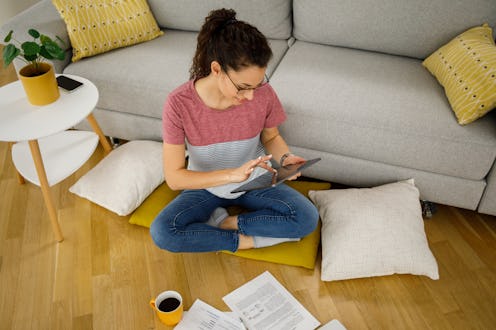Life
“I Feel Like I Am Trapped”: How 3 Women With ADHD Are Dealing With Quarantine

By now, most of us are familiar with the struggles of coronavirus lockdown: the isolation, the Zoom call problems, the shortages at the supermarket. One group of people who are feeling added pressure are those with attention deficit hyperactivity disorder (ADHD), a condition that affects working memory, attention, and organizational skills. Managing ADHD can be a challenge even in everyday circumstances, but women dealing with it right now tell Bustle that social distancing is triggering ADHD symptoms and throwing their self-care practices for a loop.
"It’s so hard when people expect you to operate 'normally'," Karina, 26, tells Bustle. "My day-to-day is usually so packed, between meetings, walking to my favorite coffee shops, or brainstorms with my team, that it fulfills my need to constantly be doing something." Without that cycle of activity to help deal with her energy, she says, she's finding it hard to work from home efficiently. Some women are also finding the stress around the coronavirus and its fallout is making some ADHD symptoms worse. But they tell Bustle they're finding ways to cope in lockdown, from recording Zoom meetings to dancing breaks in their apartments. Here's how three different women are dealing with ADHD right now.
Lexi, 29
"I’m currently working from home. I was diagnosed with ADHD when I was 15, but have struggled with it since early childhood. I was only a month into my new job when we had to make the transition to working from home in mid-March, and it has been challenging to find ways that work for me to stay engaged and focused.
"Working at home has come with added challenges. Since my anxiety is on high, it exacerbates some of my ADHD symptoms. I can no longer quickly stop by a coworker’s desk to confirm expectations on a project or brainstorm ideas, or pick up on physical or verbal social cues in an office setting. This lack of social connection has me regularly sending somewhat frantic Slack messages, to make sure I’m on track. I'm seeking reassurance from my co-workers and management that I’m making the right progress and meeting expectations in my new role.
"I've found some strategies that have worked for me so far. I'm requesting to record Zoom meetings for later reference, hiding my phone during Zoom meetings so I don’t try to sneak a text in and lose focus, and hanging a sign on the back of my chair when I’m on Zoom calls so my partner doesn’t interrupt and I can stay focused. I'm taking five to ten minutes away from my desk every couple of hours to stretch or dance to relieve anxiety and boredom.
"I also make a concerted effort to reach out to coworkers for one-on-one Zoom calls to stay connected and engaged in work projects and share ideas."
Karina, 26
"I was diagnosed with ADHD at 23, and my ADHD is my silent but ever-present business partner in my own business. I'm always needing to consult with it to make sure it works for both of us. Being a business owner with ADHD during safer-at-home regulations has, in full transparency, been incredibly difficult.
"Candidly, some days I feel like I am trapped. I stopped my medication several months ago because I didn’t like the way it made me feel, and prancing around my studio apartment during calls and going on runs doesn’t always do the trick.
"Not having the flexibility of being able to go about my day as usual has been detrimental to my business. I need to take walks every 45 minutes, and tend to forget important timelines. It's making my days longer, because I can’t sit still long enough to get through a normal work day, and is delaying deadlines."
Jandra, 30
"As someone who was recently diagnosed with ADHD, I've been struggling with productivity, lack of focus, distractibility, and task avoidance for years. Getting diagnosed right before lockdown was lucky. Getting a medication that actually worked was even luckier.
"But while medication has helped, my experience with ADHD and the pandemic has been weird. I was relatively calm and productive in the beginning, especially compared to my friends, and I chalked it up to the fact that I've dealt with high levels of anxiety for years. As lockdown progressed, however, I started noticing that — with my rising stress levels — the medication didn't feel like it was working. Emails started piling up, getting out of bed was harder, and my emotions were all over the place.
"I withdrew from my friends, started logging onto Twitter less, and felt more and more like I was hiding in a cave. Everything was overwhelming — I cried a lot.
"After a month, things gradually started to shift. I feel like I'm getting back to my 'normal' self — even though that normal is new to me — and I'm starting to feel like my life is moving again. I've realized that productivity is less about getting work done and more about embracing the ebbs and flows of life. There are days when my productivity levels are sky-high, but there are also days where I struggle to work for an hour, even with medication, and that's perfectly fine too.
"But even with that progress, things can still get overwhelming. I once heard ADHD described as having 59 different televisions playing in your brain at the same time, each one getting louder and drawing your attention at any given moment, with no sense of control. Lately, it feels like that, times a thousand. Some nights I'm scared to go to sleep thanks to my bizarre nightmares, and I'm still afraid to reach out to my friends. But I did watch a new movie, so I guess that's a sign of progress."
This article was originally published on